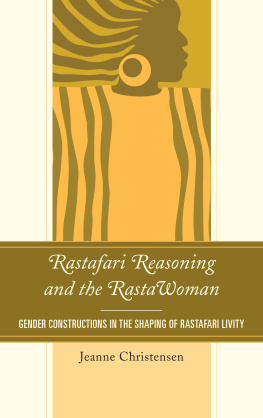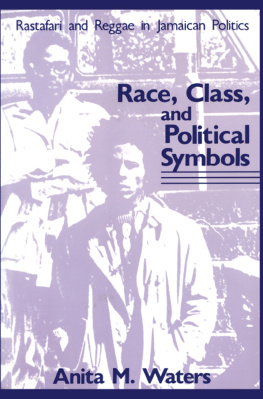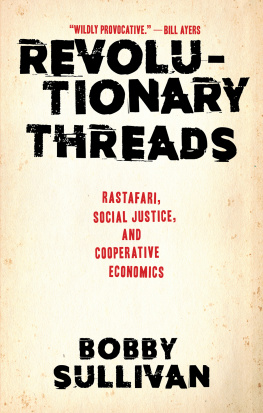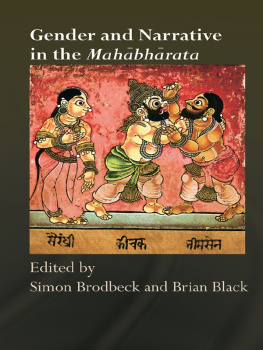Rastafari Reasoning and
the RastaWoman
Critical Africana Studies: African, African American, and Caribbean Interdisciplinary and Intersectional Studies
Series Editor:
Reiland Rabaka, University of
Colorado at Boulder
Series Editorial Board:
Christel N. Temple, University of Pittsburgh
Martell Teasley, University of Texas at San Antonio
Deborah Whaley, University of Iowa
Book Series Preface:
The Critical Africana Studies book series features critical, interdisciplinary, and intersectional scholarship within the emerging field of Africana studies. Most scholars within the field agree that Africana studies is essentially a rubric term utilized to conceptually capture the teaching and research of a wide range of intellectuals (both academic and organic intellectuals) working in disciplines or subdisciplines as discursively diverse as: African studies, African diasporan studies, African American studies, Afro-American studies, Afro-Asian studies, Afro-European studies, Afro-Islamic studies, Afro-Jewish studies, Afro-Latino studies, Afro-Native American studies, Caribbean studies, Pan-African studies, Black British studies and, of course, Black studies. Epistemological and methodological advances in Africana studies, as well as historical and cultural changes, over the last fifty years have led to an increased interest in continental and diasporan African history, culture, thought, and struggles. The Critical Africana Studies book series directly responds to the heightened demand for monographs and edited volumes that innovatively explore Africa and its diaspora employing cutting-edge critical, interdisciplinary, and intersectional theory and methods.
Authors and editors in this series are Africana studies and other scholars whose work decidedly challenges the notion that Africana studies is merely another name for racial and ethnic studies. Much more, Africana studiesat least, as conceived of within the world of this seriesinvolves identifying the most pressing problems confronting, and the most viable solutions offered to Africa and its diaspora, especially African America. Therefore, to state the obvious: people of African origin or descent seek to grasp and grapple with a lot more than race and the harrowing realities of racism. The political economies of colonialism and capitalism equally come into play. Sexism, heterosexism, and black sexual politics are also extremely important variables that must be taken into consideration. In addition, religious affiliation, ecological devastation, immigration, nationalism, transnationalism, and transculturalism have only intensified continental and diasporan African issues and identities throughout the colonial, neocolonial, and so-called postcolonial periods.
All of this means that a wide range of epistemologies and methodologies need to be employed in our efforts to critically comprehend the contradictions and complexities of what it means to be African in light of the onslaught and aftermath of the African holocaust, racial colonization, enslavement, and various forms of apartheid (including American apartheid). Consequently, the books in this series decidedly move beyond one-dimensional and monodisciplinary theories and methods and utilize mixed methodologies and multiple epistemologiesfrom those arising from traditional single-subject focused disciplines like history, philosophy, sociology, psychology, and political science, to those emanating from newly established or emerging multidisciplinary or, rather, transdisciplinary fields such as American studies, womens studies, sexuality studies, cultural studies, and postcolonial studies. Ultimately, it is the unrepentant and insurgent interdisciplinarity and intersectionality of the books in this series that distinguish it from other African studies, African diasporan studies, African American studies, Caribbean studies, or Black Studies book series.
Reiland Rabaka, Series Editor
Rastafari Reasoning and
the RastaWoman
Gender Constructions in the Shaping
of Rastafari Livity
Jeanne Christensen
LEXINGTON BOOKS
Lanham Boulder New York Toronto Plymouth, UK
Published by Lexington Books
A wholly owned subsidiary of Rowman & Littlefield
4501 Forbes Boulevard, Suite 200, Lanham, Maryland 20706
www.rowman.com
10 Thornbury Road, Plymouth PL6 7PP, United Kingdom
Copyright 2014 by Lexington Books
All rights reserved. No part of this book may be reproduced in any form or by any electronic or mechanical means, including information storage and retrieval systems, without written permission from the publisher, except by a reviewer who may quote passages in a review.
British Library Cataloguing in Publication Information Available
Library of Congress Cataloging-in-Publication Data
Christensen, Jeanne.
Rastafari reasoning and the Rastawoman : gender constructions in the shaping of Rastafari livity / Jeanne Christensen.
pages cm. -- (Critical Africana studies: African, African American, and Caribbean interdisciplinary and intersectional studies)
Includes bibliographical references and index.
ISBN 978-0-7391-7573-6 (cloth : alk. paper) -- ISBN 978-0-7391-7574-3 (electronic)
1. Women in the Rastafari movement--Caribbean Area. 2. Rastafari movement--Caribbean Area. 3. Feminism--Caribbean Area. 4. Feminism--Religious aspects. I. Title.
BL2532.R37C49 2014
299.6'76082--dc23
2013044515
 TM The paper used in this publication meets the minimum requirements of American National Standard for Information Sciences Permanence of Paper for Printed Library Materials, ANSI/NISO Z39.48-1992.
TM The paper used in this publication meets the minimum requirements of American National Standard for Information Sciences Permanence of Paper for Printed Library Materials, ANSI/NISO Z39.48-1992.
Printed in the United States of America
Preface
I conducted my fieldwork in Kingston, Jamaica, out of whose ghettos Rastafari philosophy spread. I hoped to begin to understand the evolving intellectual perspective of the Rastafari movement at the beginning of a new century, and to have the opportunity to engage Rastafari women. Formal interviews had the advantage of being consensual: people could choose to speak with me or not. The generosity of most Rastafari I approached for an interview surprised me in its graciousness. Interestingly, women proved less willing to grant interviews without careful screening than did men. On several occasions, women chose not to grant an interview. A prominent Rastafari woman, who suggested I contact her by email, refused me an interview, suspicious of my intentions and my email address. Ironically, the email address assigned to me by the University of the West Indies happened to be jchrist@uwimona. A good number of my contacts, however, led to interviews; some of these interviews initiated relationships, and sometimes even friendships.
During my fieldwork I discovered that progressive thought and political activism in Jamaica coalesced around the Rastafari, and that a great deal of information could be accessed on a regular basis through newspaper articles, radio programs, lectures, and book launches. The Rastafari also hosted numerous public events and celebrations open to any persons interested in attending. Events occurred throughout the year to commemorate Rastafari holy days (holidays)the birth of Haile Selassie, the day of his coronation, the anniversary of his visit to Jamaica, and Ethiopian Christmas and New Year. Rastafari celebrate Marcus Garveys birthday, Emancipation Day, and the birthday of Leonard Howell, one of the original founders of Rastafari. I encountered more active and visible participation by women in the movement than my reading led me to expect, and although formal interviews tended to spotlight the more outspoken and assertive RastaWomen, I had opportunities to observe informal interactions that demonstrated that RastaWomen asserted their rights quite vocally. My own gender assumptions became visible as I began to perceive the subtle differences in the way gender expressed in the Caribbean. I established enough common ground with a few women to explore these differences.












 TM The paper used in this publication meets the minimum requirements of American National Standard for Information Sciences Permanence of Paper for Printed Library Materials, ANSI/NISO Z39.48-1992.
TM The paper used in this publication meets the minimum requirements of American National Standard for Information Sciences Permanence of Paper for Printed Library Materials, ANSI/NISO Z39.48-1992.